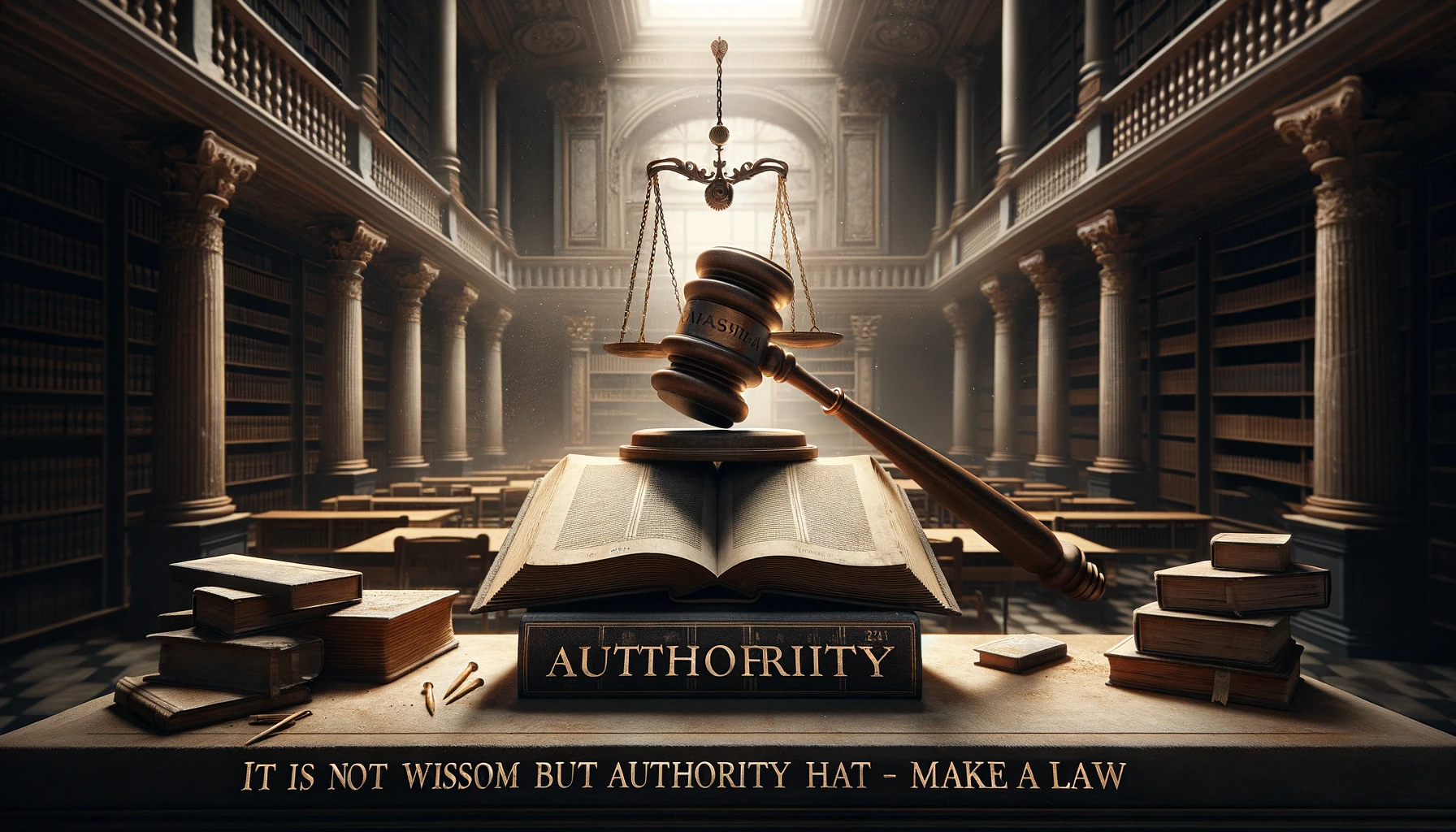Laws are the foundation of human societies, defining boundaries, establishing order, and ensuring justice. Yet, the creation of laws is not always a straightforward process driven by wisdom or morality. The phrase, “It is not wisdom but authority that makes a law,” attributed to T. Tymoff, underscores a critical truth about the legal systems of the world. This statement challenges the assumption that laws are inherently wise or just, highlighting the pivotal role of authority in shaping legal frameworks. In this article, we will explore the significance of this statement, examine historical and contemporary examples, and analyze the implications of authority-driven lawmaking.
The Role of Authority in Lawmaking
Authority is the cornerstone of any legal system. In democratic societies, this authority often resides with elected representatives, while in autocratic regimes, it may be concentrated in the hands of a few. Regardless of the governance model, authority determines who has the power to enact laws, enforce them, and interpret them.
Authority-driven lawmaking is not inherently negative. For a society to function, there must be a central body or individual capable of creating and enforcing laws. However, the prioritization of authority over wisdom can lead to the establishment of laws that are unjust, oppressive, or out of touch with societal needs. This distinction is crucial because it highlights that authority does not always equate to moral or intellectual superiority.
Historical Examples of Authority-Driven Laws
History provides numerous examples where authority, rather than wisdom, dictated the creation of laws. One prominent case is the apartheid laws in South Africa, which were enforced by a minority government to maintain racial segregation and discrimination. These laws were rooted in the authority of the ruling regime, not in wisdom or justice.
Similarly, during the era of colonialism, imperial powers imposed laws on colonized nations that prioritized the interests of the colonizers over the welfare of the local population. These laws were legitimized by the authority of colonial governments, even though they were often exploitative and unjust.
In the United States, the Jim Crow laws that enforced racial segregation in the South were another example of authority-driven legislation. Despite their widespread acceptance at the time, these laws lacked moral or ethical justification and were eventually dismantled through civil rights movements.
Authority Versus Wisdom: A Complex Relationship
The tension between authority and wisdom in lawmaking is not easily resolved. Wisdom often calls for empathy, foresight, and an understanding of long-term consequences. On the other hand, authority is about the power to enforce decisions, regardless of their wisdom. This dichotomy raises the question: Can authority and wisdom coexist in the creation of laws?
In ideal circumstances, wise individuals or bodies hold positions of authority, ensuring that laws are both just and effective. However, this ideal is rarely achieved. Political systems are often influenced by biases, vested interests, and the limitations of human judgment. As a result, laws sometimes reflect the priorities of those in power rather than the collective good.
Contemporary Implications of Authority-Driven Laws
In today’s world, the phrase “it is not wisdom but authority that makes a law” remains profoundly relevant. Many modern laws are shaped by political agendas, economic interests, or cultural biases rather than a commitment to fairness or progress. For instance, lobbying by powerful industries can lead to regulations that favor corporations at the expense of public health or environmental sustainability.
Another example is the criminalization of dissent in authoritarian regimes. Governments with unchecked authority often enact laws that suppress freedom of speech and punish political opponents. These laws are not born out of wisdom but are tools of control.
Even in democracies, authority-driven laws can emerge. Partisan politics and short-term electoral gains sometimes take precedence over long-term societal benefits. This phenomenon highlights the ongoing challenge of aligning authority with wisdom in legislative processes.
The Importance of Accountability
To mitigate the risks of authority-driven laws, accountability mechanisms are essential. Transparent legal processes, independent judicial systems, and active civic engagement can serve as checks on the misuse of authority. By fostering a culture of accountability, societies can ensure that laws are not only enforceable but also just and wise.
For example, judicial reviews allow courts to assess the constitutionality of laws, ensuring that they align with fundamental rights and principles. Similarly, public participation in lawmaking, such as through consultations and referendums, can bring diverse perspectives to the table, enhancing the wisdom behind legislative decisions.
The Intersection of Law and Morality
While authority grants the power to create laws, morality questions their justice and fairness. A law may be legally valid yet morally questionable, as seen in instances like slavery, apartheid, or the suppression of women’s rights in various parts of the world. The intersection of law and morality is where societies must grapple with the ethical implications of authority-driven laws. Laws rooted solely in authority may uphold systems of oppression, whereas laws informed by morality aim to advance equality, justice, and human dignity. Bridging this gap requires an ongoing societal dialogue about what is truly fair and just.
How Power Dynamics Shape Legal Systems
Authority often reflects the power dynamics within a society. Historically, those in power have used authority to create laws that protect their interests. For instance, during feudal times, lords enacted laws that entrenched their privileges while suppressing the rights of peasants. Similarly, modern governments sometimes enact laws that disproportionately benefit the wealthy and influential. These dynamics show that authority-driven laws are not always neutral but are frequently shaped by the socio-political context of their time, emphasizing the need for vigilance and advocacy by marginalized groups.
The Role of Public Opinion in Shaping Laws
In democratic societies, public opinion plays a significant role in lawmaking. While authority still creates the laws, public demand and societal shifts influence the legislative agenda. Movements like the push for LGBTQ+ rights, environmental protections, and gender equality demonstrate how collective voices can steer authority toward wisdom. However, public opinion can also be manipulated by propaganda or misinformation, leading to laws that may not align with the broader interests of justice. This dual-edged influence highlights the complexity of integrating wisdom into authority-driven legal systems.
The Dangers of Blind Obedience to Authority
Blind obedience to authority has historically led to some of humanity’s darkest chapters. When people accept laws without questioning their moral or ethical implications, authority becomes unchecked, and abuses of power flourish. The Nuremberg Trials after World War II revealed the consequences of following laws without moral reflection. This underscores the importance of critical thinking and active participation in questioning authority, ensuring that laws serve the common good rather than the interests of a select few.
Technology’s Impact on Authority-Driven Laws
The digital age has introduced new dimensions to authority-driven lawmaking. Governments worldwide are grappling with issues like data privacy, artificial intelligence, and cybercrime. In many cases, laws regulating these areas are created by authorities with limited technical understanding, leading to legislation that may not fully address the complexities of the issues. Moreover, technology companies wield significant influence, often shaping regulations to favor their interests. This evolving landscape demonstrates the ongoing tension between authority, wisdom, and the rapid pace of societal change.
Moving Toward Wisdom-Driven Laws
Although authority will always play a role in lawmaking, striving for wisdom-driven laws is essential for creating equitable societies. Wisdom in lawmaking involves considering long-term consequences, diverse perspectives, and the well-being of all citizens. This requires inclusive governance, where policymakers consult experts, engage with communities, and prioritize ethical considerations over personal or political gain. By fostering such an approach, societies can ensure that authority is exercised responsibly, aligning laws with principles of justice, morality, and progress.
Conclusion
The statement “it is not wisdom but authority that makes a law” by T. Tymoff offers a sobering reminder of the realities of lawmaking. While authority is necessary for the creation and enforcement of laws, it is not a guarantee of justice or wisdom. History and contemporary examples reveal the potential pitfalls of authority-driven legislation, underscoring the need for accountability, transparency, and public involvement in legal processes.
Ultimately, the challenge lies in bridging the gap between authority and wisdom. By prioritizing ethical considerations, fostering inclusivity, and promoting accountability, societies can move closer to achieving legal systems that are not only authoritative but also wise and just. This balance is crucial for the progress and well-being of any society.










